
How to suffer successfully.
This is a truly epic fantasy xianxia romance spanning three realms that is heavily imbued with characters, cosmic rules and hierarchies, black and white magic and other elements from Chinese mythology and legend. Even though many of the themes are familiar, they are brilliantly woven into a riveting and memorable fantasy fairy-tale of how all beings - deities, demons and humans are capable of good and evil; no one is immune from love and hate and all the emotions in between. We are all different and yet still the same.After an devastating war, both the demon lord and god of war disappear and peace returns to the realms. A thousand years later, Chu Xuanji is born into the Chaoyang Sect; one of the righteous cultivating sects. At an elite martial arts tournament, she meets Yu Sifeng, the rising star and heir apparent of the mysterious Lize Palace. A strong bond of friendship is formed between the younger generation that leads them on many adventures as they pledge to help Xuanji recover shards of a magical artifact that can restore her six senses. In doing so, they set in motion a chain of events that can lead to the return of both the god of war and the demon lord and once again bring chaos to the realms. They also uncover secrets of their past incarnations and conspiracies that follow them to the present.
Where this xianxia stands out from the other huge xianxia hits of past years is that there is a very well written external plot that is not just there to facilitate the love story. Both the internal and external plot are very well woven together and are mostly evenly paced so that both plot lines converge into a very satisfying and climatic ending. In fact, the external plot is much more intriguing and balanced than the love story so I urge you to resist spoilers and just enjoy the gradual reveal of the backstory and the way it impacts many of the main characters. Although this director still cannot seem to restrain his excessive love of angst, at least in this drama the internal plot did not manage to destroy the external plot as it did in Under the Power. Indeed I personally enjoyed the external plot and colorful surrounding characters much more than the love story notwithstanding the sparkle between the leads.
As for the love story, well it has all the hallmarks of a xianxia hit - it is an extreme and obsessive love story that transcends many lifetimes and thousands of years and is undaunted in the face of challenges by more powerful beings from the three realms. Phew! Exhausting! The chemistry between the OTP is undeniably both sizzling and moving. It does not hurt at all that both actors smooch with an enthusiasm rarely seen in these kinds of shows. But the way the relationship is written is too unbalanced with Sifeng taking way too many hits for Xuanji. Most of the angst takes place in episodes ~40s+ which is late in the game and after the couple already goes through many experiences that should cement their mutual trust. So for Xuanji to be so easily swayed and manipulated makes her character regress and seem just not smart (as opposed to heartless). To deal with her so shabbily just so that Sifeng (who had already gone through so much), can spit blood a few more times is unnecessary and excessive. Within the most angsty arc, the drama indulges in flashbacks and digresses into boring one dimensional characters (e.g. Yanran) with little plot advancement. Everything comes together again in the final 6 episodes that culminates in one of the most engaging and strongest finishes I have seen in a long time. It would have been much better had they explored some of the threads in the last 6 episodes earlier and in greater depth.
As the backstory is revealed, it is evident that Xuanji is an old soul that experienced a lot of trauma that still echoes from her past incarnations and restrains her emotional development. This doesn't really come out until the end because while the main cast is really quite exceptional, Yuan Bingyan is the weak link. She did an amazing job as the young and artless Xuanji and as Xuanji in love with Sifeng but was not able to mature the character or convey some of the rage, torment from her past incarnations that haunts her character nor can she fully convey the inner conflict Xuanji experiences when forced into heart wrenching choices. This becomes most apparent at the end when stacked up against the more nuanced and compelling portrayals by Cheng Yi, Li Xinze and of course Liu Xueyi as the drama draws to an emotionally epic climax at the end.
I know Cheng Yi is by far the fan favorite and is in a completely different league in terms of his acting skills and his unforgettable portrayal of Sifeng's indomitable love and the unthinkable suffering he goes through for Xuanji. This character and this actor is a true example of how to suffer successfully, spitting blood so painfully beautifully time after time that it never fails to fan the flames of rabid fandom to new heights. While he is a truly amazing actor, I think it is actually Liu Xueyi's Haochen that is the anchor of the entire production. I know this is an unpopular and uncommon view but the truth is this drama begins and ends with this character. He must be one of the most manipulative, duplicitous, hypocritical and universally hated villains out there that I still can't help feeling pity for. Liu Xueyi's acting is truly phenomenal from his portrayal of an arrogant high deity who can't even see that he has fallen in love to his conscious acknowledgement that he has strayed from the right path but keeps on going nonetheless. The complexity of his emotions, the suppressed fury when he is thwarted and the inner conflicts he experiences is effortlessly and subtly conveyed with the twitch of a facial muscle, a flicker of an eyelid or a tiny tightening of the lips. In his own way, he suffers as much as Sifeng but obviously not as successfully - probably because he swallows and bottles up all that venom and suffering instead of spitting it right out like our Sifeng. I will leave you with one final thought - love him or hate him, we must thank Haochen. Because if he did the right thing to begin with, there would be no love story.
While for me this falls short of a masterpiece, there is so much more to it than a smoking hot love story and it is so rare to get such a good villain that is complemented by such an outstanding cast. The production value is very high and they did a fabulous job with the CGI. When I finished watching it, I felt like it was a 9.0 but unfortunately a year later, I was never even tempted to re-watch any part of it so I downgraded this to an 8.5/10.0.
Was this review helpful to you?
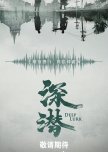
To see all without being seen.
Deep Lurk 深潜 is an intriguing and immersive Republican era spy thriller; one of the few that pulled me in from start to finish. It is set in 1939, at the prelude to the first Battle of Changsha. Changsha was a strategic city that the Japanese tried and failed to take four times from 1939-1944. As a result, they were never able to consolidate their territories in Southern China. At the time, the Republic of China's Nationalist Army had seriously considered abandoning the city but Xue Yue, the commander in charge of Changsha's defense refused to budge. As a result of terrain, Changsha could only be flanked from the east or the west, making it a difficult city to both attack and defend. In this kind of set up, intelligence and counter-intelligence can make a win-or-lose situation difference for both sides.After a botched assassination attempt on Xue Yue, a traitor escapes to Shanghai with strategic Changsha defense intelligence. Multiple parties converge upon him in Shanghai to intercept the intelligence. The players include both the Changsha and Shanghai station of the KMT Military Intelligence (NBIS), the Wang Puppet Regime, the Japanese Military and hidden CPC operatives. Yun Hongshen, the idealistic young second master of the illustrious Yun family is sent by his father Yun Muzhi to observe. Predictably, this sharp but impetuous young man raring to make a difference does more than that and his path tangles with that off brave young NBIS agent Wen Yeming tasked to hunt down the traitor. An auction for stolen intelligence relating to the Japanese army's plan of attack for Changsha results in a deadly scramble to obtain or retrieve the intelligence. This coincides with the re-emergence of Kunwu, a long dormant Japanese spy and Muzhi's nemesis. Hongshen is lured back to Changsha, where he must crack the code to the intelligence and smoke out Kunwu in order to save his city from the encircling Japanese army. He reunites with Yeming at NBIS where they pit their wits against this master spy who seems to be able to see all without being seen.
The first three episodes are fast paced, exciting and littered with clues and character introductions and needs to be watched (and re-watched) carefully. But the setup and the storytelling is so intriguing I was compelled to re-watch; to make sure I didn't miss anything. It's been a long time since a drama pulled me in so deeply that I was literally unable to watch anything else at the same time. Even though there are some logic holes, the overall plot is tight and riveting. All the important characters are introduced early on and they are multi-faceted and grey with different loyalties and motives that reflect the clash of culture and ideology and the rival factions within the KMT during that pivotal era of change. The narrative brilliantly builds a credible case around several key characters with motive, means and opportunity to be Kunwu and maintains the suspense into the final episodes.
This drama has an all-round stellar cast anchored which by veteran actors including Wang Jingsong and Liu Huan and brilliant character acting by Hou Mengyao's disingenuous Milan, Han Chengyu's ruthless and competitive Ling Han and Zhang Tianyang's well-meaning Yun Hongqi. I really enjoyed watching Hongshen meticulously narrow down the suspect list and try to out-scheme the hidden master spy who eluded his father for years. The young Cheng Yi brilliantly captures how this character's intelligence and survival instinct makes up for his lack of experience and the shattering consequential mistakes he makes along the way. It is a shame that this drama has not enjoyed wider viewership. For this genre however, I don't need romance and I didn't enjoy Ying'er's acting or the couple's chemistry. I was far more invested in the Yun family's close bond and amused by how Hongqi and Hongshen are so different and resourceful in their own unique ways. Zhang Tianyang is a subtly hilarious actor and his brotherly scenes with Cheng Yi are among the drama's best moments for me.
Despite many cut scenes, the pacing, suspense and excitement holds up into a strong finale that delivers a good ending twist that deftly avoids one reversal too many. My only disappointment is that I had hoped for a more complex villain origin story. I won't say more to avoid spoiling the reveal. This is by far the best Republican spy drama I have watched since The Rebel (2021). I am happy to rate it the same at 8.5/10.0 despite its lower budget. It is a good watch if you are in the mood for some mental gymnastics but it can also be enjoyed simply as a fast paced spy thriller.
Was this review helpful to you?

Being bad never looked so good.
Rose Finch unfolds like a dark, chilling, and morbidly sensational penny dreadful set in Republican-era Shanghai. The story opens with a bizarre and graphic double murder involving an elite showgirl at Rose Finch (Zhuque Pavillion/朱雀堂), the hottest nightclub in town. Detective Tang Zhenyun is hot on the case, enlisting the aid of talented forensic scientist Xia Mo. Their paths cross with Gao Ying, the enigmatic and deadly boss of Rose Finch, who alternately aids or obstructs their investigation as suits her agenda. She seems intent on uncovering who is murdering her "songbirds" while protecting her family's interests. Is Gao Ying friend or foe?This is a fast-paced, gripping crime thriller that, with its 20-minute episodes, has no time to waste on romance or typical drama digressions. The plot remains tightly focused on one major case, delivering relentless momentum. It’s more violent than expected, unflinchingly portraying the lawlessness and rot festering beneath the era’s decadence.
Wan Qian anchors the narrative with her awe-inspiring portrayal of an inscrutable, powerful, and ruthless mobster’s daughter who lives by her own code. Being bad never looked so good! Zhang Cheng also impresses as the pugnacious, hot-blooded Detective Tang, always ready for a brawl. I was surprised to see Qin Junjie in such a haunted, nerdy, and low-key role, but as a team, this unlikely crime-solving trio clicks perfectly. My only gripe is the dead spouse trope, which feels a bit maudlin and out of place.
The ending has some mildly unsatisfying aspects—it’s dark, cynical, yet oddly fitting for the era. A fantastic short watch. 7.5/10.
Was this review helpful to you?

Three birds with one stone.
I am a huge fan of black comedy and throw in some gangsters and I am hooked. Chen Kuilin is an infamous hitman on the run. Diagnosed with terminal illness, he tries to turn himself in only to discover he is merely the third most wanted criminal in Taiwan. Quivering with outrage, he sets out to secure his street creed as the biggest, baddest, bad guy of them all by taking out his competitors.Ethan Juan floored me with his complex portrayal of this brazen, brutal, narcissistic gangster with crazy but understandable motives and an odd instinct to protect the weak. His close shave with Hongkie had me on the edge of my seat and their killer vs killer fight scenes were raw and savage. His desire for redemption and salvation at the commune surprised me until it didn't. A terrible betrayal culminates in a shocking bloodbath that masterfully builds and releases tension.
This is a well paced, intense and violent action thriller with a number of unanticipated twists. The dialogue is superb and dark humor is deftly used to release tension and infuse a sense of lingering irony. It has all the elements of the good old Hong Kong gangster movies from its distinct cinematic style to the emotional depth of the characters that belies the casual onscreen violence.
I thoroughly enjoyed this movie but I must admit that the final ten minutes left a feeling of nagging disappointment. The perfect place to wrap this up would have been at the reveal of the hitman that takes out three birds with one stone. The last ten minutes embraces maudlin tropes that are characteristic of Taiwanese productions. In this case, it completely ruins the no regrets nature of the beast. I have no choice but to knock 0.5 off my rating so this is overall an 8.0/10.0 for me. I strongly recommend skipping the last ten minutes.
Was this review helpful to you?

The hunt for a serial killer.
Who is He is an intensely gripping police procedural that narrates the hunt for a serial killer that evaded justice for decades. It draws inspiration from two well known, real life cases - the 1988 Gansu serial killer case and the 1996 Nanjing University dismemberment case. These investigations were hampered by a lack of access to modern forensic technology, especially DNA evidence. The brutality and horror of these cases instilled national shock and outrage. For those following the heinous Abby Choi case in Hong Kong, the dismemberment case invokes chilling parallels.During the hunt for a serial killer in 1988, Wei Guoping comes within a hairsbreadth of capturing him. In a close encounter, Guoping saves the intended victim Nie Xiaoyi but loses his partner. He has survivor's remorse and the case continues to cast a shadow over his existence long after it goes cold. Eight years later, he is convinced that the 1988 killer has resurfaced in the shocking Nanjing University dismemberment case.. His peers and superiors however are concerned that his rushed conclusion could steer the investigation down the wrong path. The drama dives into the inner workings of the department and how they collaborate and resolve internal conflict. It shows us that there are many ways to skin a cat and internal debate is healthy and produces a more rigorous process with defensible chain of evidence, and effective witness and suspect testimony.
This drama does a fantastic job zooming in on the procedural aspects of an investigation from the thankless, painstaking and smelly task of collecting and analyzing evidence to effective (and not so effective) methods of interviewing persons of interest. Without modern forensic technology, it is like looking for a needle in a haystack and can span decades. The show's meticulous attention to detail and commitment to vivid realism makes it stand out in the genre. The uncanny simillarity in the dumpster dive scenes to real footage from the recent Abby Choi case adds another layer of intrigue and sense of real life horror. There is an everpresent sense of urgency and suspense that is captured by highlighting the terror of the witnesses, survivors and the afflicted communities. The audience is also kept invested by dramatising the character aspects of the investigative teams and how unsolved cases can haunt key members of the investigative team.
The character writing and portrayals are among the drama's strongest aspects. Zhang Yi delivers yet another exceptional performance as a hard core detective single-mindedly focused on hunting down the 1988 killer. His Wei Guoping is a much less perfect character than An Xin (from The Knockout), which makes him more interesting and relatable. I loved how Gu Kaiyan calmly puts him in his place, asserts her authority and earns his grudging respect. The rapier-like way she breaks down and corners a suspect in interrogation is insanely awesome. Xu Fangyi steals the show with this riveting portrayal of a cooly logical and formidable female cop. The unique mixture of camaraderie, conflict and attraction between Wei Guoping, Song Zhe and Gu Kaiyan really made the team dynamics fun to watch.
Where the drama falters is in plot. This is somewhat unavoidable as the underlying cases are true crimes where major breakthroughs were only achieved with the help of DNA, which is ultimately anti-climatic. Maybe it would have been better if they went with something similar to Netflix's wildly successful serial killer docu-drama format rather than to try to dramatise it. The less interesting crime syndicate arc with the overused "forbidden" romance with a gangster's sister trope grew bigger than itself in the final third of the drama. Logic holes emerged and there were simply too many coincidences to force disparate cases to converge. The antagonists' motives in particular were contrived and in the Gansu case, deviates too markedly from the profile of the real serial killer. This may have been one of the reasons it was so harshly criticised by Chinese audiences. Because of well written protagonists and all around strong acting, I don't think this was that bad of a drama although it did not live up to its early promise. As a fan of the genre, I still enjoyed this well enough and rate it 7.5/10.0
Was this review helpful to you?

A River Runs Through It
The illusory peace of a sleepy riverside town is shattered by a murder that recalls a twenty year old cold case. Shan Feng, who was just a boy then, partially witnessed the murder of his crush Xiao Baige (little white dove) returns to his hometown to investigate these possibly connected cases. His inquiries reopens old wounds and reveals the festering impact the lack of closure Xiao Baige's senseless murder has on her friends, family and the town.The premise and darkly intriguing ambience and suspenseful tension of this drama really drew me in at the beginning. And I can't fault the execution from the pacing; to the top notch acting; to how the disparate threads gradually converge into the river that runs through these quietly spooky remote towns. Where the drama falls down is the story is excessively melodramatic and the motivators of many of the key protagonists and antagonists rings hollow. Many characters in this drama are driven towards doing terrible, terrible things but their actions and trauma they suffer seems out of proportion to the events that catalize these extreme reactions. Too many of the characters are deeply dysfunctional and are driven towards tragic outcomes simply for the sake of inflicting pain on the surrounding characters.
The strongest point of the story is how the main villain hides in plain sight and is revealed gradually as everything comes together and how the story illustrates that in these small rural towns there are really only two degrees of separation between people. But just like I felt the first victim was just not interesting enough to have inspired such profound reactions from so many people, the triggers for the villain's derangement are unconvincing. The role however, is brilliantly acted and the character comes across as both lugubrious and menacing.
Bottom line this looks like a crime thriller, it tries very hard to be one and it almost feels like one but at its core, something rings hollow. It is not terrible, a lot of effort obviously went into it and it is a decent quick watch for some cheap thrills. I give it a 6.5.
Was this review helpful to you?
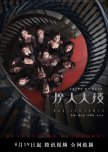
Tangled
Disguised as a classic whodunit, this is really a drama about how the law does not always protect the vulnerable or deliver justice. It also tangles with some pretty heavy social issues that are a bit more than what I signed up for. To me, this is a drama that can't decide what it wants to be so while I still enjoyed it, I don't regard it highly as far as mystery thrillers go.This drama starts out strong - shockwaves rock the community of the posh Horizon Tower when their lovely cafe owner Zhong Meibao is found dead in her apartment under suspicious circumstances. The cynical and disorganized Zhong Jingguo is assisted by the more methodical Yang Ruisen in investigating this case. They interview everyone on the scene of the crime including a security guard, an architect, a novelist, a real estate agent, a housekeeper and friends and family of the victim. From these varying sometimes contradictory accounts of the events of the day and recollections of their interactions with the victim, outlines of the various possibilities start to emerge. The first 8 episodes or so of this were superb; exactly what I would want to see in this kind of genre. The occasionally shady, hilariously kinky, bittersweet glimpses of what happens behind close doors added just the right dose of dark humor and mundane daily existence.
The issue is at episode 8, the victim's backstory is told in a anime which gives away a big chunk of the plot and took away much of the excitement for me. The storyline dives deeply into the victim's backstory and traumatic past which is connected to a number of suspects. At that point, it is not hard to see where the story is headed. I did not expect to watch a this kind of story it is not what I was in the mood for. I don't mean to diminish the importance of these social issues that are frequent themes in this kind of genre but this drama took me away from the mystery for too long to overly explore these topics. Angelababy is also not best suited to play this kind of role either; a better actress could have done a lot more with it even though they may not manage to look as tragically beautiful. The fact that I felt a lot sadder for her parallel character in the anime version than I did for her Meibao says it all. Similarly I found the antagonist in the anime more complex and had a more convincing purpose for his actions whereas the parallel character is just a violent and not that intelligent pervert. The photographs which he used to exert power over his victims would have indicted him and sent him to jail forever. To me, that is the big logic hole that made me lose respect for the intelligence of characters I am supposed to sympathize with.
The outstanding performances in this drama are by the two detectives; they are the glue that pulls the backstory and all of the plot threads together. The inner conflict Ruisen experiences as she struggles between her empathy for the victims and her duty to enforce the law even if it means justice is not done really is impressively conveyed. This is a drama where there are real consequences for taking the law into our own hands and debates whether the high price of justice is worth it. While these important themes were well articulated, the whodunit never really regains the momentum and mystery of the first half. Although it would have been a darker ending, the entire drama builds predictably towards what plays out in the penultimate episode. And then in typical c-drama fashion, they couldn't resist delivering one final tangled twist that delivers what could have been an alternate ending. Except there wasn't a real proper build up to it, there is no deducing we just see a replay of what went down in an open and shut case. This all takes place in the last episode and left me feeling vaguely cheated. Consider stopping at episode 15.
Although this drama got tangled into too many themes and twists, this is still a good watch and something I am happy to recommend to fans of the genre although for me it didn't live up to the hype.
Was this review helpful to you?
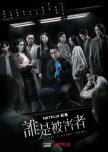
To be or not to be.
This is a short, gripping and dark crime drama that revolves around a grisly series of murders that are mysteriously linked to Aspergic forensic analyst Fang Yiren's estranged teenage daughter. In a desperate bid to find her, he teams up with Xu Haiyin, a resourceful but rather unscrupulous and ambitious young journalist to unravel the cases. They are an odd but effective team as his meticulous forensic work reveals the how while her intuition and ability to understand and manipulate people uncovers the why.Joseph Chang's portrayal of Asperger's alone makes this drama worth watching. I would tear up at his portrayal of Yiren's frustration and inexpressible pain at his inability to emote and connect with people. Far from being oblivious (which would actually be merciful) Fang Yiren is well aware of this handicap that devastates his family and alienates his colleagues but yet helpless to do anything about it. Although I didn't like Tiffany Hsu's Haiyin in the beginning, I think her depiction of how Haiyin schemed to manipulate Yiren initially and ultimately came to understand and empathize with him was nuanced and layered. The essence of their chemistry is in the very lack of chemistry between them. The acting is so brilliant it pulls you into rooting for an unrelatable character and a dislikable one (initially). This is an almost unnecessarily dark drama; literally every character is dysfunctional, has family problems and/or smokes like a chimney.
For me, the murder mysteries were a side show and not the main meal. The plot is overly ambitious and weaves together too many complicated themes from mental illness, various social injustices, transgender issues, terminal illness, corporate greed, vengeance and, atonement in addition to the ultimate and super heavy question - "to be or not to be". While the first few cases were clearly linked, the intertwining of subsequent cases and relationships became more tenuous and were arguably unnecessary as Yiren's daughter was implicated in the very first case. The ultimate reveal was a surprise mainly because both motive and means were unconvincing and the acting by the main antagonist was very weak in sharp contrast with impeccable performances by the rest of the cast. It is a pity because what is missing is a deeper exploration of the father daughter relationship, something I suspect this production could have pulled off compellingly.
The production values are very high; it revels in impressively shocking and gruesome crime scene detail and unflinchingly exposes the mundane and exhausting clutter of ordinary lives. One of the things I really enjoyed about the drama is the proliferation of several dialects from the very expressive cussing unique to Taiwanese Hokkien to of course Mandarin and even Cantonese. But for all the high production values and effort, the last episode was really the weakest and the ending had an unfinished feeling. For some reason, this reminds me of Netflix's controversial but higher impact 13 Reasons Why, which is a much more focused and terrifying exploration of a few hard core subjects rather than a scratch on the surface tour of too many that is this drama. Nonetheless, the acting is superb and the story will put you in a thoughtful mood for some time.
Was this review helpful to you?

Sweet with a bitter aftertaste.
Love of Nirvana or The Flowing Water 流水迢迢 is a deep, dark, intricate and impactful drama about politics, revenge, love and freedom. The plot and characters are three dimensional and the love story unfolds within the complex dynamics of multiple conspiracies and an uneven battle for justice and freedom. Jiang Ci is a free spirited country girl seeking adventure in the Liang capital Qingkang for the first time. She climbs the wrong tree at the wrong time to watch peace talks between the Liang and Wei states and inadvertently foils a dangerous, high stakes mission. Stabbed and then hunted down by a masked intruder who believes she may be able to identify him, she is rescued by the ambitious Marquis Pei Yan. He uses her as bait to lure and capture the masked prowler. Thus a clever and free spirited country girl becomes the pawn of two ruthless men and becomes embroiled in a diabolical conspiracy that oppressed and enslaved the Yueluo people. All of the characters in this story, including the almighty emperor, get to choose their own destiny but not their fate. Like the flowing water that may be momentarily grasped or diverted, fate is ultimately elusive and flows where it will.This is one of the those dramas where the storytelling respects audience intelligence and perceptiveness. There is very little spoon-feeding or over explanation; we are expected to read the subtext and form our own impressions of what the characters are going through. At the start, I was rooting for Jiang Ci to skin Wei Zhao alive and flaunt his fur like a trophy for the way he treated her. And then with a growing sense of unease that turned into horror, I started to observe the plight of the Yueluo people and the scale of the collective punishment that was being visited upon them. At that point, the narrative angle shifts from Jiang Ci to Wei Zhao and like Jiang Ci, we see his devastating sense of isolation and helplessness; that he alone bears burden of his father's villainy.Jiang Ci's inadvertent and continued meddling had life and death consequences for his men and his cause. Of course he had to deal harshly with her. Jiang Ci doesn't just fall in love with a man, she falls in love with a place and a people who are slowly but surely being erased by Liang's genocidal policies. Their evolution from enemies to lovers is gradual, natural and convincing.
All of the main roles are well portrayed, with the actors conveying multiple layers to their characters via their facial expressions and gestures that goes beyond the dialogue. Ren Jialun is not that versatile an actor but Wei Zhao is the kind of complex, man of few words role that he excels at. With a flicker of an eye, a small frown or a dark glare, he can exude emotions from frustration and anger to sorrow and dismay. The way he regards Jiang Ci changes from rage and hatred to grudging respect and empathy to Ren Jialun's signature bottomless longing. Wei Zhao never dares speaks of the future, it is Jiang Ci who simply refuses to let him pull away. He understands she is a free spirit and his selfless instinct is to set her free in sharp contrast with Pei Yan's selfish obsessiveness and his repeated attempts to cage her. Li Landi's Jiang Ci steps up to the plate to more than meet Wei Zhao halfway. I love how she so unabashedly gushes over how handsome he is and freely expresses her affection for him. Even though the noble Pei Yan has arguably more to offer, she chooses Wei Zhao unconditionally each time. Their sweet loving lies, their body language and the dialogue within their dialogue made me tear up many times.
No one has an upper hand in this story because characters are too clever and adept at pre-empting one another. Xu Zhengxi delivers a evocative portrayal of the brilliant, ambitious, manipulative and controlling Pei Yan. If this role is to be his swan song, it is one that leaves an impression. His ambition and obsessiveness are amplified and exceeded by his mother, the domineering Madame Rongguo; another riveting depiction by the super talented Wen Zhengrong. Unfortunately all of these fantastic characters are dealt a huge disservice in the penultimate arc, where we meet shifu, the only truly stupid and pointless character in this story. All of hitherto smart characters are dumbed down by one or two notches for an unnecessary court power struggle arc and melodrama. Madame Rongguo's overreach was futile and unnecessary and Pei Yan's selfishness had irreversible consequences. Only the wise and constant Cui Liang's character survived that arc that was clearly written by an amateur.
The narrative comes together again for a triumphant, exciting and moving final arc. Fate is blind and the taste of freedom is sweet with a bitter aftertaste. Nobody gets everything that they want but the greater good is achieved at great cost. However, not all the individual outcomes were inevitable and the ending itself could have been more tightly written. It appeared as if they were on the verge of a different, more satisfying ending but didn't have the courage to go there. I will elaborate further on that in a spoiler below. All things considered, this is still one of the better, more memorable period costume dramas this year with a complex and moving plot and outstanding acting. Despite the flaws, it is a story that has enough depth that I am compelled to rate this generously at 8.5/10.0.
ENDING SPOILER
My biggest problem with the ending is that Wei Zhao chose to stay when he could have escaped and left the hairpin behind as evidence that Wei Zhao died and returned to Jiang Ci as Xiao Wuxia. It is clear from the ending footage that they toyed with a "traitorous official Wei Zhao is dead, long live Xiao Wuxia" ending but decided to stay true to the novel. I would have been fine with that if they just blew up the whole thing and didn't give him a choice. The fact that he had one broke me; it was out of character and a betrayal of Jiang Ci. It also made no sense since was never revealed that Wei Zhao is Xiao Wuxia and thus Wei Zhao's actions should not implicate the Yueluo people. It was just dumb and unnecessary noble idiocy. Even though it is a happy ending for Yueluo, it is simply too distressing an outcome for both Xiao Wuxia and Jiang Ci, who deserve better. It would have been just as fitting and much more satisfying for Wei Zhao's memory to live on in infamy while Xiao Wuxia and Jiangci live wild and free with their son even if they can never return to Yueluo. That is how I would have ended this story.
A smaller point, I also hated the maudlin farewell scene. Throughout the show Jiang Ci and Wei Zhao's feelings did not have to be put into words. I wish they kept it that way.
X
Was this review helpful to you?

An eye for an eye will make the whole world blind.
This is the empowering, female focused historical drama that I have been waiting for. Finally in Li Changge, we get a strong, smart, independent female lead character who seeks meaning in life beyond being just an extension of the male lead and his dreams. Not that Wu Lei's Ashile Sun is anything to throw popcorn at because this man is a total keeper from his fabulous thunderbolt eyebrows all the way down to his baby toes. No, I haven't actually gotten to his baby toes, my screen appears to be ahem... stuck... in a perpetual loop around about his stunning bare chest but I am sure they past muster. Even disguised as a man, Dilraba is such a peerless goddess no male lead ever seems good enough until Wu Lei rocks up to turbocharge this smoking hot OTP into one of my all time favorite drama couples. Don't be fooled by my shameless, shallow gushing, this is so much more than just another idol drama. All of the main characters in this drama start out as young people who don't know who they want to be when they grow up. They go on an incredible journey of self actualization to discover their true values and best selves.This story begins with Li Shimin's bloody ascent to the Tang throne over the bodies of his brothers, to be the greatest Tang emperor. Li Changge, a fictional character, is his much adored niece and daughter of the deposed crown prince. Disguised as a man, she flees the capital, vowing to avenge her family and tries to marshal her father's remaining supporters to undermine her uncle. Thus Changge embarks on a long and difficult quest, making many friends including the delicious Ashile Sun along the way. She is young, naive and makes costly mistakes with irreversible consequences along the way. In the process, she discovers that the truth is never simple and there are causes far greater than hers; that an eye for an eye will make the whole world blind. Dilraba's performance as Changge is several notches above all her other works; she is not afraid to ugly cry or allow grief and rage to ooze from every pore of her being.
I picked up this drama because Wu Lei's Fei Liu is one of my all time favourite drama characters. Who would have guessed that irascible kid would have grown up to be such a sexy beast of an Ashile Sun! And Wu Lei has not lost any of his agility in delivering thrilling, heavy hitting action scenes, with his kick ass fight with She'er being one of the drama highlights. But what really is on fire is his chemistry with Dilraba; their mutual attraction does not have to be expressed in words. When Sun tells Changge "From now on, you are my slave" his entire being screams "From now on, I am your slave." It is so refreshing to have a couple that understands each other, is honest with each other (even about lying to each other) and shares the same world vision. Ashile Sun's manliness comes from the fact that he is not threatened by Changge's independence and strength, he glories in it. Together they find that forgiveness brings peace and liberation. I am also most pleased that not all the men fall in love with Changge, Mimi is more the femme fatale.
Changge's cousin and closest confidante Leyan is inadvertently thrown on a similar journey. They are polar opposites by nature and deal with challenging situations in completely different ways but both show immense courage and fortitude. Leyan is the character that shows the most growth in this drama and even though usually weepy characters give me rashes, I was not allergic to Zhao Lusi's empathetic portrayal. Fair to say, the princess and the icicle is very cliche but Liu Yuning and Lusi really capture what made it such a popular trope to begin with. Sadly they must have cut those scenes where the uptight Haodu thanks Wei Shuyu for buying him looser underwear with tears in his eyes because poor Wei Shuyu never gets any love despite how he redeems himself later on.
As much as I find this drama's character development addicting, it must be said that the plot is flimsy and requires heavy suspension of disbelief. This is partly because the plot development is constrained by historical facts. While it is very cool to journey with our characters to all the historical hot spots and watch them interact with great historical figures while history plays out, the plot itself doesn't amount to much more than that. Changge's mother's story is tragic but anti-climatic as far as mysteries go and that is the problem, the drama doesn't really have a climax. The entire last arc is not only implausible, the main antagonist was mis-cast and their acting was so appalling I really cringed through many moments of the final few episodes. As for the ending, I found it most fitting. Weddings are not the same without family, permission was asked and received and beautiful vows were exchanged. We don't need more than that.
Broadly speaking, men are followers of women in this drama making it is the ultimate female fantasy fiction that on sheer addictiveness and enjoyment factor alone merits a 10/10. But objectively speaking it also has some flaws that make an overall 8.5/10.0 more fair.
Was this review helpful to you?

The truth will make them free.
This is a review of The Blue Whisper in its entirety - I will not review Part 1 and Part 2 separately.The Blue Whisper is an enthralling fairytale about how love can be both imprisoning and liberating. Set in a fantasy world where sky immortals or fairies instill order and earth immortals or demons are prone to chaos, romantic entanglements between these two clans are forbidden. This kind of inter-species ban pretty much ensures that sky immortals and earth immortals fall for each other with reckless impunity.
Ji Yunhe is the most consummate spirit master among Wanhua Valley's elite cadre of demon tamers. She longs desperately to escape from the Valley; to see the world and be free. Chang Yi, a magnificent and powerful merman is captured by the wicked, conceited Shunde fairy, who tasks the Valley to tame and enslave him. Seeing it as her ticket to freedom, Yunhe vies with her sect brother, the Valley Master's son Lin Haoqing, to complete the task. Where Haoqing attempts to torture Chang Yi into submission, Yunhe beguiles him with kindness, friendship and love. Yunhe successfully manipulates and entices the naïve Chang Yi's heart for her own selfish ends. Along the way, the player gets played as Yunhe falls for his sincerity and sees that it is wrong to enslave such a pure hearted and innocent being. But even though she sacrifices to free him, her well intended lies set in motion a cycle of half truths, sacrifices. betrayals and captivity that ensnares them both. After a long and difficult quest for freedom with many trials, they understand that it is the truth that makes them free.
The story is set in a stunning, enchanted fantasy world with a vivid magical color palette, mystical sets and the best costumes and styling I have seen in a long time. The CGI is well done but errs on the side of being heavy handed at times. The storytelling however, leaves quite a bit to be desired. There are way too many artifacts, especially pearls with endless magical properties to conveniently save the day. And when dead characters keep being revived, both the element of surprise and the emotional impact is diminished. In addition to unnecessary side characters, there are altogether five well developed CPs that explore repetitive tortured themes of taboo relationships, deception, betrayal and how love can both be both confining and liberating. A few of these side stories are not interesting and too long winded and the frequent alternating between too many CPs and plot threads breaks the momentum of Yunhe and Chang Yi's story and makes the main plot stagnate as well. Thus I did not feel Yunhe and Chang Yi's chemistry or get invested in their storyline until Part 2 where many threads converge and the storytelling improves markedly.
I am really happy to see Dilraba take on the role of such a complex and conflicted character as Yunhe; one that undergoes so much anguish and such profound change. Though she made me feel her love and pain many times, I still like her portrayal of the cunning, manipulative and self serving Yunhe in the beginning best. As for Ren Jialun, he is a master of the unspoken and of intense suffering in silence. I can't fault his performance and am simply tickled that he is willing to do so many kiss scenes with the exquisite Dilraba. They look so incredible together in this production that they must be the most gorgeous costume drama couple by a wide margin. That said, while Chang Yi is intensely single minded when it comes to love, loyalty and righteousness, this is not innately a complex character and thus the role doesn't quite do Ren Jialun justice in terms of broadening his acting repertoire.
The character that compells me to the point of stealing the show is Lin Haoqing; brilliantly and sublimely articulated by Xiao Shunyao. From the get go, I was more drawn to Haoqing's chemistry with Yunhe - they are on the same wavelength, bound by history and layered and complex emotions. Like Chang Yi, Haoqing is torn between duty and Yunhe but unlike Chang Yi who is more reactive, he proactively schemes ahead, takes bold risks and tries for win win outcomes. Lin Haoqing and Yunhe get to do all kinds of interesting and important things that advance the plot while poor Chang Yi is relegated to safeguarding Beiyuan and dealing with the petty, boring issues of the fox clan. Chang Yi only comes in useful in mighty showdowns and even then, his power ups are marred by unflattering camerawork that catch him scowling angrily as if he is trying to take a dump. I can't help but feel that the plot short changes my beloved sour faced Ren Jialun, an actor I am super fond of. That said, I only have praise Xiao Shunyao's ability to make me feel Lin Haoqing's suffering no less than Chang Yi and Yun He's. I hope good things happen to this handsome and compelling actor.
Though I don't consider Xian Shi or Shunde's motives as villains that convincing, both roles are very well acted. In fact, Guo Xiaoting's Shunde can give one of my all time favorite villains, Angelina Jolie's Maleficent a run for the money. Guo thrusts herself into the role with mesmerising relish and wicked abandon. A dash of dark humor would have rendered the portrayal incomparable. As for the rest of the (too) extensive cast, even though a few characters got screen time that was disproportionate to the substance of their storylines, the roles are well performed enough to win a place in my heart. The friendship, support and sacrifice from Fan Zhen and Lishu as well as the hilarious Kong Ming and Luo Luo is clearly what gets Yunhe and Chang Yi through the loneliness of their many trials and tribulations. And I just simply love the idea of such a youthfully adorable Tian Jun.
This drama finishes strongly with an exciting and well chareographed final confrontation. But I won't lie, the ending is a bit of a blue whimper. There are simply too many reversals that make me roll my eyes. As for the final 5 minutes, it succumbs to c-drama's nasty habit of wanting to be all things to all people. Nonetheless, it is still an acceptable finale that from a certain point of view can be seen as quite fitting. The storytelling in Part 1 tried my patience and is at best an 8.0 but I really enjoyed Part 2, which I can happily rate a 9.0. Since I don't think it makes sense to rate both parts separately, this is an 8.5 overall. As of end April, this is my personal top ranked drama for 2022.
Was this review helpful to you?
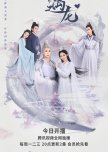
Which asshole wrote this script?
That was the best line in Miss the Dragon, a xianxia that just misses the boat. It is a thought that jumps to mind at various points of the drama. The writer must be someone with both self awareness and a sense of humor. Which you must have plenty of if you choose to watch this because it can be so ridiculous and silly that you almost have to just laugh at it.The story opens with the injured dragon king Yuchi Longyan rescued by a maid Liu Ying who mistakes him for a common snake. Liu Ying rescues injured animals, including the bird elf Qingqing while she daydreams about the mythical dragon king. The first arc is largely an amalgamation of the best moments of other hit xianxias, notably TMOPB. When it comes to recycling other drama's memorable moments, it best be either a really clever parody or a vastly superior moment. In this case it is neither. Some of the writer's own original humor is fresh and funny enough they should have just gone with that and focused on fleshing out the main couple and getting us invested in their relationship. Instead, after being vividly reminded of some old favorites, I am left with the impression of two rather blank characters whose shallow infatuation with each other was unlikely to last until supper time, forget several lifetimes.
While Liu Ying does get a tad more interesting with each subsequent lifetime, there is little of substance that survives each incarnation. So it is not clear what Yuchi Longyan is fighting for, what is innately so special about Liu Ying that the dragon king loves so much. Zhu Xudan did a good job essentially playing four different characters but she is wasted in these sappy rather simple roles that any newbie actress can play. As for Wang Hedi, after a delectable opening scene of him emerging scantily clad from the dragon pool, I was left with an indelible impression of an overdressed plank. His portrayal of the dragon king is an impressive study of the art of being bizarrely still and plank like while everything else is moving. At first, I thought he was accidentally sent the script from a botox commercial. Then I started to feel insecure about accidentally hitting pause on my remote. Bottom line, I didn't feel any spark between the leads. Oddly, his interactions with all of the other characters are so much more natural and enjoyable. I rarely comment on the OST and the BGM but in this case I must point out it was good enough to make me tear up much more than was induced by the acting or story during the sad moments.
The idea of a love that transcends lifetimes is very powerful and moving but that concept is much more originally and engagingly explored in the second couple's story. Indeed the love story between the block of burning ice that is Xue Qianxun the master of Luofeng Pavilion and his flighty chirpy little bird elf Qingqing is why I didn't drop this drama. Both characters are better developed and they have understandable motives and goals. Their relationship is so humorous and their chemistry builds so organically that I had to root for them and was intrigued by and impatient to discover their past. I won't spoil it by saying more than that is a wonderful and memorable mini fairytale in and of itself and that is what the focus of this drama could and should have been.
The way the drama ends goes a long way to redeem itself. I really ate up the epic magical battles and even though the villain is quite lame and was obvious to me from the beginning, I like how all the pieces of their scheming is revealed and how it all ties in quite neatly with the plot and the many lives of Liu Ying. I am solidly in the camp of really liking the ending; anyone who knows the legend of Nuwa would not be that surprised by it. Overall its not a bad watch, it has quite some entertaining moments beyond just laughing at the production. My rating gets a bump up to a 7.0/7.5 due to the wonderful second couple and ending at the climax.
Was this review helpful to you?
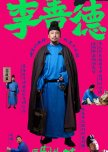
A kingdom for a concubine's smile.
Adapted from Ma Boyong's novel of the same name, The Litchi Road is a biting satire of a besotted old man's folly; an emperor who squanders a kingdom for a concubine's smile. Set during the twilight years of Xuanzong's reign, it is about Yang Guifei's well known love for lychees. To mark her birthday, he orders fresh lychees ferried 2,500 miles from Lingnan to Chang’an—a fool’s errand, as the delicate fruit spoils within days, dooming the 5,000 li journey.Enter Li Shande, a humble Shanglin Bureau official, gifted in mathematics, poetry, and botany but too scrupulous and apolitical to climb the ruthless Tang bureaucracy. He’s the perfect patsy, duped into the role of “Litchi Envoy” for this impossible mission. Written with dark humor and irony, Li’s stoic resolve—“I wish to live”—resonates with powerless commoners who rally to his cause, aiding his experiments in preservation and test runs. They are aided by merchants who see a profit opportunity in an ancient cold chain logistics network that transports this prized fruit inland to Chang'an and beyond. Yet bureaucratic hurdles and corrupt officials thwart them at every turn. The narrative sharply critiques imperial excess and elite callousness while quietly celebrating the “ants”—individually inconsequential people whose collective efforts achieve the unthinkable.
Zheng Ping’an’s parallel espionage arc, clearly not Ma Boyong’s creation, feels extraneous, though Yue Yunpeng’s comedic flair—obsequious groveling masking seething resentment—adds humor and depth to Li Shande and Xiu’er’s characters. His grudging aid, driven by his affection for Xiu’er, is touching, but a sharper writer might have made his plot arc more relevant and ended his and Gouér's journey in a more fitting way. Lei Jiayin shines as Li Shande, a relatable and at times frustrating anti-hero; a well-intentioned person who makes promises he can't keep and whose forbearance is ultimately exhausted by the iniquity around him.
Fans of Longest Day in Chang’an will spot familiar faces in new roles, with similar aesthetics and themes as this story unfolds over a dozen years later. The emperor, still smitten with Yang Guifei, balances power between the Left and Right Chancellors. The prose sparkles with wit, weaving classical phrases, puns, and Li Bai’s poetry for layered meaning. Lingnan’s sun-drenched palette and tropical costumes showcase the vastness and diversity of Great Tang. While Longest Day is a higher budget and more polished production, Litchi Road is a more fun watch. The sharp social commentary and heavy profound moments are balanced by levity and memorable hilarious scenes—like the uproarious, very 1990s cockfight (no animals harmed) that had me in stitches.
The ensemble, villains included, earns applause. He Youguang, the petty tyrant, and his scheming secretary Zhao Xinmin deliver comic gold, their fowl play both hilarious and menacing. The evolution of the ancient cold chain, aided by foreign merchants’ spice-transport methods, fascinates, while diverse characters add exotic richness. Amita’s strory ends abruptly, likely due to actor Nashi’s controversy, which taints the drama’s reception. However she landed the role or got where she is today, Nashi's acting is solid; far better than many popular leading actresses. Her look is so stunning and exotic it is hard to imagine anyone else pulling off Amita with that kind of boldness and flair.
The finale takes an odd turn, flirting with supernatural elements before winking at its own fictionality—an acceptable, if imperfect, close. The recurring “bad things happen to good people” theme feels realistic but heavy, with two gratuitous deaths and undeserved outcomes (good and bad) for many. Still, many bad guys fall, the good guys score a small but significant victory, and and fresh litchis are enjoyed by the story's true beauty in a poignant reunion. Despite a strong start, it misses a 9.0 but earns an enthusiastic 8.5/10.0.
Was this review helpful to you?

Wuxia at its best!!!
This is one I had heard about years ago but somehow never got around to. So thrilled to have changed that. This is what a good, old fashioned Wuxia movie is all about in terms of honest to goodness kick ass action. None of that flying on roof top, slow motion improbable and technology assisted acrobatics that we are routinely served up with these days. Nothing but extremely well choreographed, intensive, nail bitingly lethal swordplay up close and personal. Wow - they really don't make it like this anymore.The plot isn't complicated - it is about how three highly skilled Imperial Assassins get caught up in a gripping yet relatively straightforward political conspiracy that puts them in mortal danger. They are a bit of a Chinese Three Musketeers with a dark side as they risk their lives for a pittance and are unable to fulfill their deepest personal desires. They are not your traditional virtuous wuxia heroes but they live by their own moral code. Shen Lian (Chang Chen) is the most deadly and most morally ambiguous of the three. Chang Chen pulls off this complex role exceptionally well, subtly conveying deep and varied emotions underneath an intense, brooding and taciturn demeanour. Zhou Yi Wei also brilliantly pulls off another grey character. In fact, many of the cast have delivered wonderful performances in key roles in many recent hit dramas. The only exception is Ethan Li's rather unmemorable performance as the more care free youngest brother Jin Yi Chuan. This actor has since regressed and gone on to weigh down a few otherwise very strong dramas for me. (Why does he still get work?). I also was under impressed by the romance element of the story - this role was not well written and not well acted. That made Shen Lian's infatuation with her not relate-able and one reason I haven't rated this more highly. That said, this is not really a romance and I thoroughly enjoyed this so definitely if like me you never got round to this, now is the time.
Was this review helpful to you?

The bugs will inherit the earth.
Three-Body is Tencent's adaptation of the first book of Liu Cixin's award winning sci-fi trilogy Remembrance of Earth's Past. It is an immense, mind-bending and terrifying book that explores the dark corners of humanity and our place in the universe. The narrative is concept-driven and lacking in terms of both characters and plot. This drama adaptation fleshes out the characters and plot while staying largely true to the original works.An alarming number of leading scientists around the world die mysteriously. One of them, Yang Dong is a friend of nano-scientist Wang Miao. This seems oddly linked to an ominous countdown that only he can see and a virtual reality Three-Body game developed by ETO, a secret organisation. He gets roped into the murder investigation by an irreverent cop Shi Qiang. With the help of Yang Dong's mother Ye Wenjie, they start to pull at the threads that go back to the Cultural Revolution to reveal a conspiracy with existential implications. Rather abruptly, Shi Qiang gloatingly blurts out what is coming before we are are even half-way through the drama! This monumental conclusion is so matter-of-factly accepted without debate that it adds to a sense of anti-climax. Then we get an extended flashback to a brutal, frank and scathing depiction of the Cultural Revolution that unflinchingly exposes the loss of common humanity, the utter despair and loneliness of the period and the rage that must lurk beneath the surface.
The drama does a fantastic job bringing Wang Miao, Shi Qiang and Ye Wenjie to life. They are far better fleshed out in the drama than the book and all three anchor roles are deftly articulated by veteran actors who can convincingly navigate difficult transitions over time periods and into virtual reality. Yu Hewei's sarcastic and badass Shi Qiang is by far the most engaging and hilarious character. I didn't love Zhang Luyi's Wang Miao at first but he grew on me as his rapport with Shi Qiang grew. Unfortunately the other roles are not well written and made worst by vapid (Shen Yufei, Pan Han) or annoying (Mu Xing) performances by mediocre actors whose shortcomings are glaring up against the seasoned main cast. I wouldn't have minded if they got little screen time but unfortunately they featured prominently in extended largely drama-invented sub-plots that were barely touched upon in the book. I had to grit my teeth through the coma inducing preaching with the nationalistic subtext on monotheistic religion and environmental extremism.
High concept hard science fiction stories like this are difficult to adapt because the plot is driven by exposition and there is a lot of that in this drama. These concepts are conveyed creatively in a visually engaging manner to be easily accessible to layman. I enjoyed many of the analogies such as the Turkey/Farmer and the Shooter. However, the production tends to over-explain and tediously repeat the sci-fi aspects. Some judicious editing and higher confidence in audience intelligence would have gone a long way toward making this drama less draggy.
Even though this is shot in movie aspect ratio and a lot of care went into the props and the staging and lighting very artistically captures the bleak and portentous tone of the story, the production values overall are only of average quality. The background music is simply dreadful - jarringly loud and tries too hard to conjure a sense of dread or suspense that is at odds with the dry sci-fi plot points. The use of a difficult to understand and cliched artificial voice over an entire episode made my head throb. But what I was most dismayed by was the virtual world of the Three-Body game. While there is quite a bit of cool stuff like the dehydration and rehydration process, the overall effect is like stepping into a cartoon-like animation. It is just not at all scary. There is no sense of chaos or the searing intensity of the huge atmospheric variations and that gripping fear of what comes next that is described in the book.
The penultimate episode if you can make it that far is the best and only truly thrilling and epic episode in the entire drama. The wrap up is good in the sense that it is faithful to the novel even though the main antagonist is a bit whitewashed and not remorseless enough. This narrative takes over twenty hours to tell you something you already know; that the bugs will inherit the earth! The book covers it in about five hours and there is hope that the movie will be able to do it in under three. This is a good watch if you are in a contemplative mood and wish to indulge in a bit of history, philosophy, math, physics, speculative hard sci-fi and ponder the future of humanity. And if you have time and patience. I only rate this 7.5 because I feel the story could have been much more compellingly told in about half the episodes and not in a way that was a chore to watch.
Was this review helpful to you?


 67
67 280
280 8
8 2
2 6
6 2
2 2
2 1
1 1
1 6
6 1
1 1
1 1
1 2
2 2
2 2
2 4
4
















